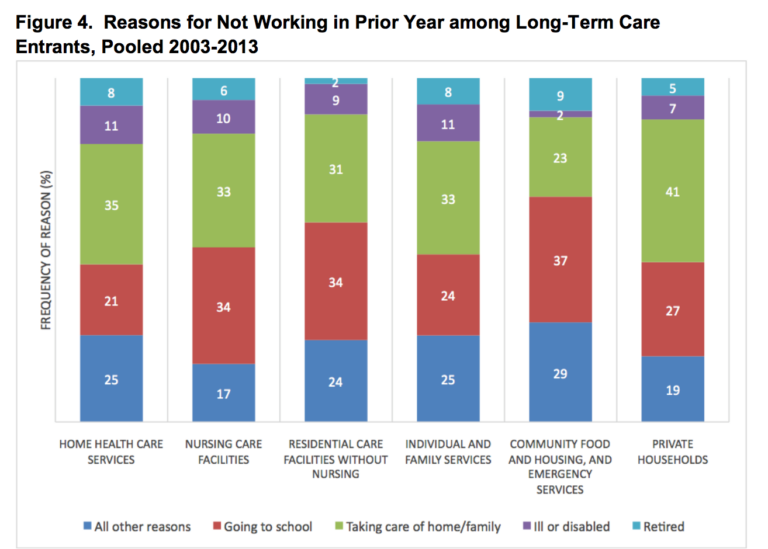
By 2030 the world will need many more senior care professionals than ever before. It may not be a field that comes to mind first for college students and recent grads, but within the next decade, senior care providers, managers and leaders will be in high demand. And Millennials along with Generation Z (whose oldest members will be nearly 30 by 2030) will be most likely to answer the call.
What’s driving this growing need for senior care and the ensuing war for talent in the industry?
And, if you’re a recruiter or senior leader in the industry, what can you do to compete for and win the best talent?
The Growing Need
- As Baby Boomers age, the number of Americans aged 65 and older is expected to nearly double from 1.3 million in 2010 to 2.3 million in 2030. (source)
- Currently 4% of social workers and less than 1% of physician assistants specialize in geriatrics. (source)
- Less than 1% of RNs, pharmacists and physical therapists are certified in geriatrics. (source)
- By 2030 the projected ratio of geriatric physicians to older Americans will be 1:4,245. (source)
- By 2030 the projected ratio of geriatric psychiatrist to older Americans will be 1:20,195. (source)
- The kinds and categories of senior and long-term care options continue to increase. But even as the demand for care rises, workers are exiting all sectors of the long-term care industry faster than they are entering it. (source)
Caring for an aging population is a moral imperative for our country. Who will do the work? And who will lead the changes in the industry that will ensure our elders get the quality, compassionate care they need and deserve?
Select the Right Talent
The need will certainly be there. But not everyone is cut out to fill the need. Focus on finding the right people because they will be the ones who do the best work, remain the most committed and grow into the leaders of your future. It sounds counterintuitive, but making your selection process more – not less – rigorous can actually make your organization more attractive to the right people.
“Don’t ask what the world needs. Ask what makes you come alive and go do it. Because what the world needs is people who have come alive.” – Howard Thurman
Focus on what makes people come alive.
People may not have experience with caregiving, but if they can answer yes to questions like these, a career in senior care might be what makes them come alive:
- Do you love helping people?
- Can you naturally pick up on what people need even if they don’t tell you?
- Do you have a gift for staying calm and composed, even in trying circumstances?
- Are you quick to notice even small changes in people?
- Are you a natural smiler?
- Are you more interested in hearing other people’s stories than in telling your own?
- Can you keep track of a lot of detailed responsibilities while also making each person you encounter feel significant?
These questions are a good start, but a scientifically validated selection instrument can help you do an even better job of finding the right people who will provide the best care.
Look for top talent in unexpected places.
All of your competitors are at every job fair you’re attending. What will you do to set yourself apart?
- Focus more on potential than experience. You can teach people what they need to know about the specifics of working in senior care. You can’t teach them to care about people and you can’t install a heart for service.
- Scout and recruit continuously. Look for people who provide great service in restaurants, retail stores, libraries and community centers. Keep a keen eye out for those who seem to work especially well with older people. Ask those people to come work for your organization.
- Make an effort to connect with people who aren’t working – even if they’re not looking for a job. The graph below shows that the majority of new workers entering the long-term care industry who were previously unemployed were either going to school or taking care of their homes and/or families before entering the workforce. Go beyond job fairs to build connections with students. Work with schools to offer internships, guest speakers or mock interviews. Also, get creative about connecting with people who are caring for family members through offering support groups for caregivers or tapping into places where unpaid caregiving happens like churches, synagogues and community centers.

Source: https://www.leadingagemn.org/assets/docs/WorkersLeavingEnteringLTCJan2015.pdf
Optimize Onboarding
Bring the selection process full circle with a high-quality onboarding experience. Make people feel significant and valued starting on their very first day on the job. Help them develop positive relationships with their co-workers. Make sure they have the information, equipment, training and other resources they need to succeed. And clarify your organization’s vision and values for them in a way that helps them connect their work to a larger purpose. When people know what is expected of them, that their work makes a difference and that other people value their contributions, they will want to stay with our organization. And that’s what the next segment in this series is all about.
This post is the first in a series of three. Next up: Retain Top Performers and Develop the Leaders of Your Future.
Latest Posts: Blog

Blog October 22, 2024
Get Ready: Onboarding a Team Manager
Discover the importance of effective onboarding for new managers. Learn how to maintain team culture while fostering growth and trust.
Read More
Blog September 12, 2024
Get Ready: Building a 30 60 90 Day Onboarding Plan
Boost employee engagement and productivity with a well-crafted 30 60 90 day onboarding plan. Set new hires up for success from day one.
Read More
Blog September 09, 2024
Employee Engagement Strategies
Unlock the power of employee engagement strategies to boost productivity, retention and your organization's bottom line.
Read More
Blog August 27, 2024
Get Ready: Make Your Mid-Year Check-In Matter
Increase communication and build trust with an effective check-in. Learn how to have a productive conversation with our employee check-in template.
Read More
Blog July 24, 2024
Go for the Teamwork Gold
Discover the keys to building engaged workplace teams. Learn how coaching strategies can unlock your work team's full potential.
Read MoreBlog July 18, 2024
Let’s Talk About You: The Importance of Career Investment Discussions
We discuss the importance of Career Investment Discussions (CIDs) and how they can help you better invest in your team members.
Read More